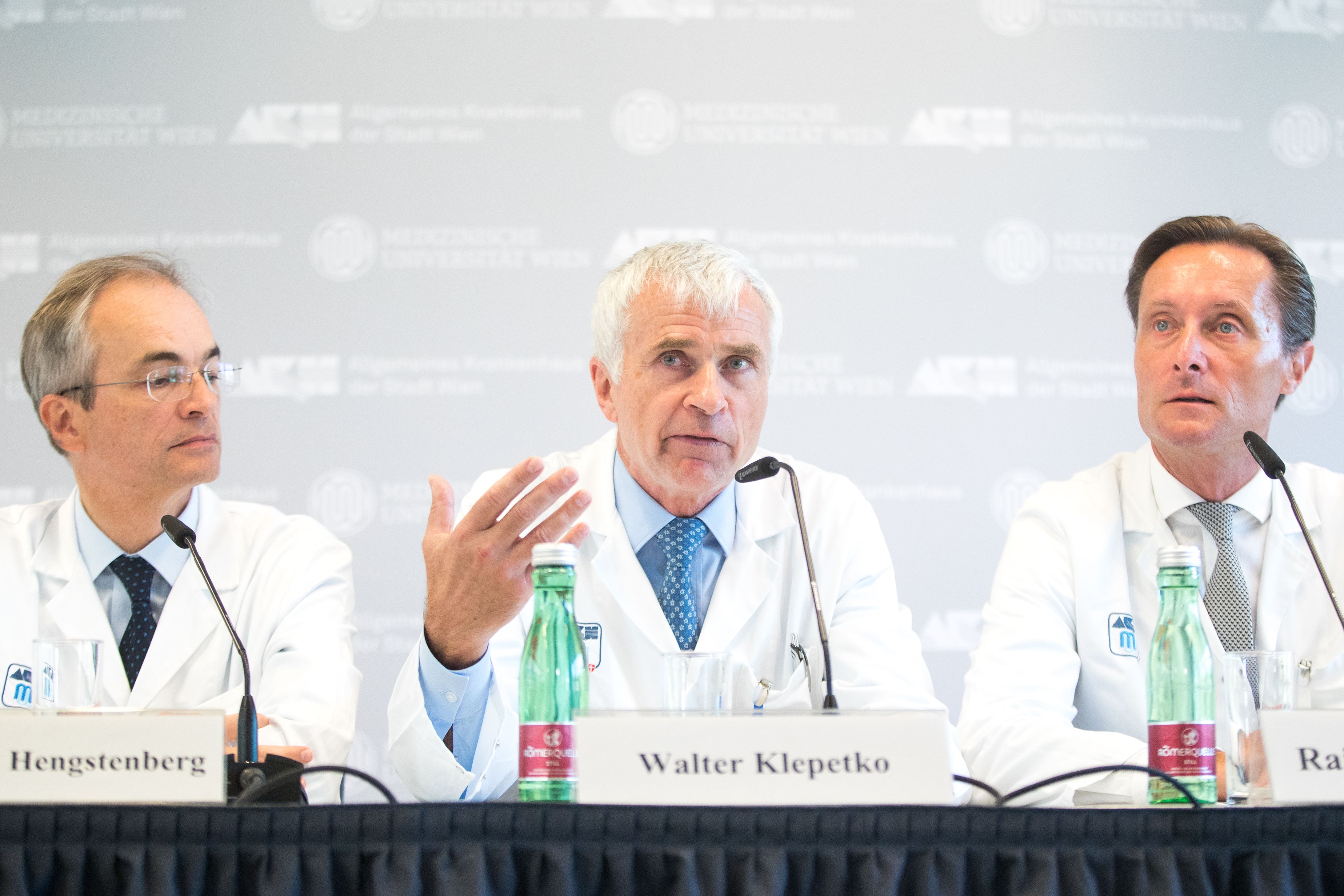
(Vienna, 8 August 2018/APA) – Six days after the lung transplant operation performed on Formula One legend Niki Lauda, the patient's recovery is "right on target". This was announced by Christian Hengstenberg, Head of the Department of Medicine II and Head of the Division of Cardiology at Vienna General Hospital and MedUni Vienna, speaking at a press conference on Wednesday.
The doctors spoke of "extremely pleasing progress". Things had not looked good for Lauda, as was clear from the doctors' accounts. Marco Idzko, Head of the Division of Pulmonology stressed that – contrary to the circulating rumours – the non-executive chairman of and stakeholder in the Mercedes Formula One team had at no point been suffering from straightforward summer flu". He was actually suffering from haemorrhagic alveolitis, which is an inflammatory condition of the pulmonary alveoli, accompanied by bleeding into the lung tissue and airways, for which Lauda was given immunosuppressive treatment. Initially this brought about a significant improvement in his breathing.
However, he then went on to develop a serious acute lung disease caused by the migration of inflammatory cells from the blood into the lung. These cells attacked his lung tissue. Lauda was then in intensive care and it was time to consider a plan B, namely a lung transplant. The Division of Thoracic Surgery under Walter Klepetko, Konrad Hötzenecker and Peter Jaksch, which runs one of the leading transplant centres in the world, was therefore called in.
All other treatment options had been exhausted and it was impossible to stabilise Lauda's condition. "We had reached a stage where his life expectancy was just a few days, or weeks at most," explained Hötzenecker. In the meantime, the aviation entrepreneur underwent extracorporeal membrane oxygenation (ECMO), which essentially consists of using a machine – a blood pump outside the body – to pump oxygenated blood into the body, so as to by-pass (bridge) the function of the patient's own lungs. Approximately 10% of the 120 lung transplant patients treated at Vienna General Hospital every year are ECMO patients, explained Klepetko.
Lauda had already been registered as a lung recipient with Eurotransplant, in the highest priority category. Patients in this category have to wait an average of five days for a new organ. As soon as they were notified that a suitable organ was available for Lauda, the collection team flew off, examined the lungs and found them to be suitable. While the team was extracting the lungs and returning them to Vienna, the celebrity patient was prepared for the operation, so as to minimise the delay between collection and implantation.
"The operation itself went smoothly, with no complications," said Hötzenecker. The new lungs had had a good primary function and the artificial support for the body functions was switched off while the patient was still in theatre.
According to Hengstenberg, straight after such a big operation patients feel "as if they had been run over by a steamroller". Says the doctor: "Lauda was extubated after 24 hours and was able to breathe independently." All organs – including the previously transplanted kidneys – are working perfectly.
Peter Jaksch from the Division of Thoracic Surgery meanwhile gave an outlook for the next few days and weeks: "As soon as patients have been extubated following the transplant, they are mobilised as quickly as possible." Normally patients remain in intensive care for a few days and their immunosuppressive treatment is adjusted. This involves a combination of drugs to suppress the immune system and thereby prevent the body from rejecting the foreign organ. Normally patients are discharged from hospital after two to three weeks and are then offered a few weeks of inpatient rehabilitation.
Lung transplant patients who have their operations at Vienna General Hospital have very good chances of survival: more than 90% one year after the transplant and more than 75% five years after, explained Peter Jaksch. This is one of the highest figures in the world.
Particularly in the first year after transplantation, there is a high risk of the body rejecting the implanted organ. Immunosuppressive therapy to prevent this has to be individually tailored to each patient. According to Jaksch, the fact that Niki Lauda has already had two kidney transplants has no bearing upon the medication. This is essentially the same but the dosage is slightly higher, "because lungs are more likely to be rejected than kidneys," says Jaksch. And it is necessary to make sure that the kidneys are not offended by the higher dosage. "But we will work it out," said Jaksch optimistically.

Niki Lauda's family will also play an important role in his recovery. The F1 legend is already able to receive a limited number of visitors, said cardiologist Christian Hengstenberg. "Of course, it is necessary to protect him against infection." To help with his recovery, it is important that he feels supported by his family. The former racing driver has a good chance of regaining a good quality of life. "We are truly expecting Lauda to be able to return to his normal way of life" said Walter Klepetko.
Klepetko built up the transplant centre at Vienna General Hospital. The first lung transplant operation was performed in November 1989, on the night the Berlin Wall came down. So far, 2000 lungs have been transplanted – 120 a year – putting Vienna General Hospital among the Top Five in the world. Approximately 10% of lung transplants are carried out on ECMO patients, in which a blood pump replaces their lung function. This makes Vienna General Hospital a leader in this field.
(APA)